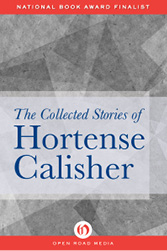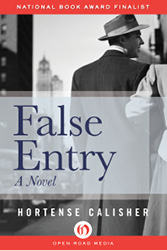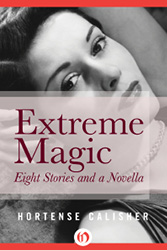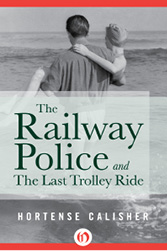The Railway Police and the Last Trolley Ride (23 page)
Read The Railway Police and the Last Trolley Ride Online
Authors: Hortense Calisher
Tags: #Fiction, #Literary, #Short Stories (Single Author)

“Lots of these get-togethers, people ask a widower to,” he said then. “Somebody will always bring out a picture of her to show me. Nine times out of ten it’ll be one of the ones taken that day. Either from somebody’s Brownie, or that long official one with all of us at the windows, or lined up at the start. And when they hear I never got one, they say, “Jim, don’t you want one? Here, I can spare it. Here, take this.” And maybe they can spare it, maybe nothing came of that day for them.
But, so can I spare it.
And I always tell ’em so. ‘I have my own picture right handy,’ I always say. ‘And what’s more, my picture has a back to it, and a smell. I can see the
inside
of the car, and Jim and Emily; that’s me and Emily, bending over the cookpot.’ And they say, looking sorry for me among one another, ‘Oh no, Jim, the cookpot was never inside there; that was back in the hall.’ But I say no, that’s the way I remember it—or prefer to. ‘I remember it all,’ I say, ‘better than a movie even, better than a Brownie by far.’ And then maybe because I feel sorry for them too and they only mean to be nice, I always give them a little laugh. Or maybe because I can’t stand for the town to think me a fool. ‘Oh,’ I say, ‘I never have any trouble at all now, keeping those Pardee girls in mind.’”
He fell silent from where he sat now, it was an easy reach to put his hand on his friend’s knee. The two old men stayed that way. From the hillside, with what human cargo locked away inside for all anybody knew, from the treetops, deserted in all their glory but not knowing it, from the Little Otselica, no sound came. And then they heard it.
What are these whippoorwill starts in the night, in the bypasses of the night—or is it day? Is this Sand Spring nineteen-twenty, or Sand Spring eighteen-ninety-eight?
It is the ride, banging through the countryside. I can see the long car, the lone car riding its dazzle of rail, and all our heads popping out of the chowder, all our heads at the windows at one time or another, riding the wine-dark night. There are stations, there are stops, and once an owl-call. Then—the solemn forever. Fa-la. Fal-la-la. La,
La.
The two men listened to it fade. It wasn’t dark going back now; it was marvelously clear.
Then the two men got up, with one accord, and looked about them. Had this clearing been kept for them? Was the quiet scene before them awful or serene: Or was it only cheap land for progress, beautiful and stubborn? Each felt he ought to say something about it, but came back to his own life—and halted before speech, even here. One of the two had been marked very early by outer events, but the other even earlier by inner ones. One had left his place of birth but had never doubted his place in the world—and had found it; one had come back to the place where he belonged and had lived his life there—full of doubts. Warriors, returned from wars, and hearing such annals as this afternoon’s, could no doubt fall upon one another’s shoulders, lean in one another’s arms, and heave there; even in modern times, it has been known.
Each for a fact hesitated. But as at every point in their lives when this might have come about—they had been friends too long. Each looked at his friend, his friend standing there in his defenseless prime, and saw how each had come to have the other’s facets as well as his own, and why so many of the human race were rightly named—Jim. And this was enough.
Then each walked the other back to the car.
And there, not surprisingly, what with the motor running for the heater to warm them, above which good and faithful sound the voice could slur or sharpen into the practical—it became easy to talk again.
“Housekeepers!” snorted the mate, not moving to go yet. “Jim—will you listen a minute?”
And Jim listened willingly now.
“I know you won’t come back to live with me. And though I know I asked you, one time, I don’t know now that I really want us to.”
“Oh—?” said Jim, who couldn’t keep back a disappointed look, as if now, he’d been about to say yes.
“Because I’ve got a better idea.” The mate warmed the small of his back against the seat, but at the same time thrust forward his forelock, so that all the tendons of chin and neck tightened; maybe he was used to doing this in front of women. The effect wasn’t bad. Then he looked Jim over—whom bereavement had thinned, taking away his potbelly. The mate nodded, satisfied. “We’re going round the world,” he said.
Over Jim’s howl of laughter, he talked only the faster, retiring them from business, property and family obligations in a dozen sentences. “The day after the dedication,” he said. “The unveiling. That’s as good a time as any to tell them. We can leave the day after. The day after, we can start out.”
“But I’ve
seen
the world,” Jim murmured. “At least a good part of it. Right here. And you’ve
been
round it. You flash that card the airlines gave you, often enough.”
“Oh, we’ll
stop
places,” said the mate. “Six months at a time, if we feel like. But you have to give people at home a solid explanation they can hand to others. ‘Going around the world, those two,’ they can say then, and everybody understands it. Have to do that, when you’re leaving
permanently.
”
Then Jim sat up as if he’d been struck, saying
“Ah.”
After a while, he said slowly “But we’re not eighty yet. Nowhere near it. I wasn’t born till ninety-three.” But he couldn’t keep a little smile from playing round his mouth.
It was the mate’s turn to murmur. “People do it younger these days. This is modern times.”
They were both smiling like idiots now, talking out of the sides of their mouths, like old lags. The mate opened the window, and bellowed to the whole audience, of which there wasn’t a cow or human—“What are we waiting for!” And Jim answered, “Nothing, just start the car!” but when the mate had done that, his passenger broke into another laughing fit, from which he cried out, “
What
a folly, Jim! They’ll never have seen a folly like this one!”
Who was meant by “they” was not spoken of unnecessarily, but you may need to know for later, to keep it by you. It was the “they” to which all such follies are addressed. So, that afternoon theirs was decided upon—or forty years before.
At first, though the car started up all right, the wheels wouldn’t catch, having sunk, during the men’s meditation, deep into grassy mud. But the two of them were a sturdy pair yet, canny with machines too, still with the strength to push and shove, and the sense where to wedge a stone under a rear tire—and at last they were free of the treacherous mud of cheap land, had shaken the dust of the old Batavia road from their spokes, and were rolling again on the highway. The pure, long hood of the Cadillac pointed like a prow, freed of rainbows, and they saw the weather once more. Old men, old men. And young.
And so—
said my grandfathers
—we’re going round the world.
We won’t ask you to forgive us old men for taking up your time and trouble. The last thing you want to do is forgive us—and we know why. It’s because we’re what you’re going to be. How could you forgive us for that? But we had to tell you. We made our miniature, and we had to show it.
So you’re going to another war, said my grandfather, and you there are going to fly a plane in it. The girls among you can only listen of course, but maybe they can go along for the ride. They’re civilians.
So, listen for
us,
said my grandfather, while we go around the world. Such odes as we make for the dead, any of us, are really for the confederation of the living—for all those who cannot even remember their own spilt blood, once it has dried; all their lives, men returned from the wars have plunged for charm. We are buddies all.
They speak in their sitting room voices, first one, then the other—our grandfathers—but already as if a clap of thunder has helped them disappear over the horizon.
Who speaks in his own voice, asks my grandfather? And my grandfather answers for him, to him and us. Not we. Not you.
It’s all transport, said my grandfathers. In the first things are the last things; this is the roll of the wheel. Wheel and sail, horse and wing, we are going round—fa la la—the world.
How long is it by bicycle to Maple Avenue? See my dust.
See my dust. See my dust. See my dust.
Even from the air,
said my grandfathers, faded and gone now.
Even from the air
—you won’t learn more.
FINIS
Hortense Calisher (1911–2009) was born in
New York City
. The daughter of a young
German
-Jewish immigrant mother and a somewhat older Jewish father from
Virginia
, she graduated from
Barnard College
in 1932 and worked as a sales clerk before marrying and moving to Nyack, New York, to raise her family. Her first book, a collection of short stories titled
In the Absence of Angels
, appeared in 1951. She went on to publish two dozen more works of fiction and memoir, writing into her nineties. A past president of the
American Academy of Arts and Letters
and of
PEN
, the worldwide association of writers, she was a
National Book Award
finalist three times, won an
O. Henry Award
for “The Night Club in the Woods” and the 1986
Janet Heidinger Kafka Prize
for
The Bobby Soxer
, and was awarded
Guggenheim Fellowships
in 1952 and 1955.
All rights reserved, including without limitation the right to reproduce this ebook or any portion thereof in any form or by any means, whether electronic or mechanical, now known or hereinafter invented, without the express written permission of the publisher.
This is a work of fiction. Names, characters, places, events, and incidents either are the product of the author’s imagination or are used fictitiously. Any resemblance to actual persons, living or dead, businesses, companies, events, or locales is entirely coincidental.
Copyright © 1966 by Hortense Calisher
Cover design by Kelly Parr
978-1-4804-3741-8
This edition published in 2013 by Open Road Integrated Media, Inc.
345 Hudson Street
New York, NY 10014







